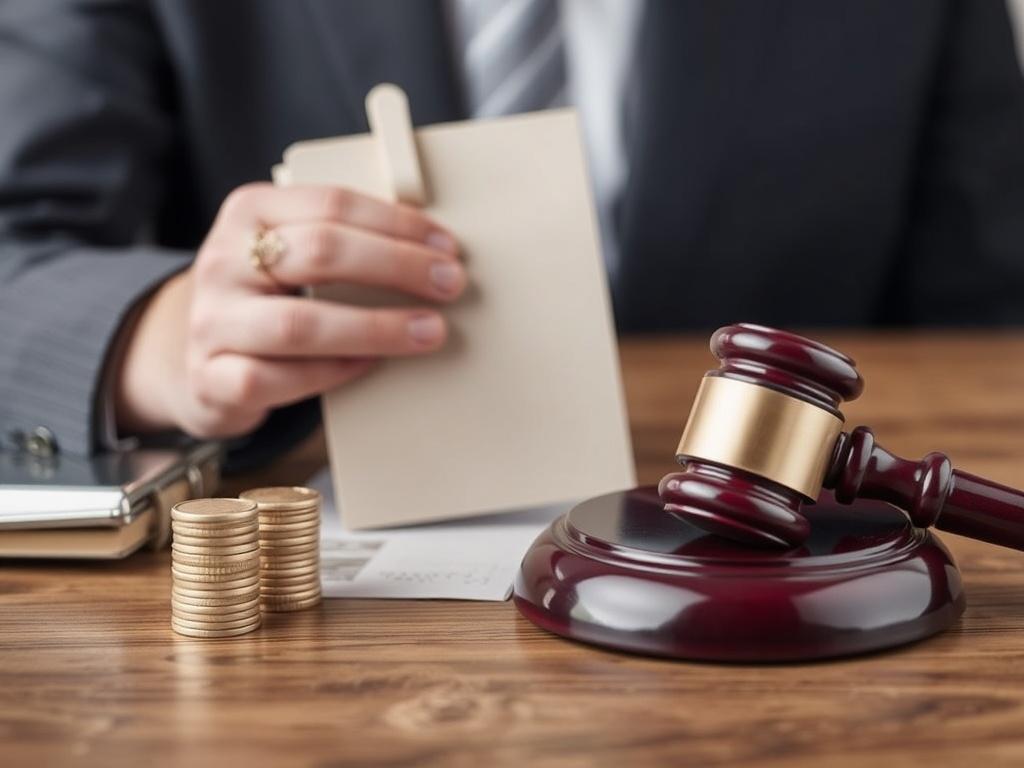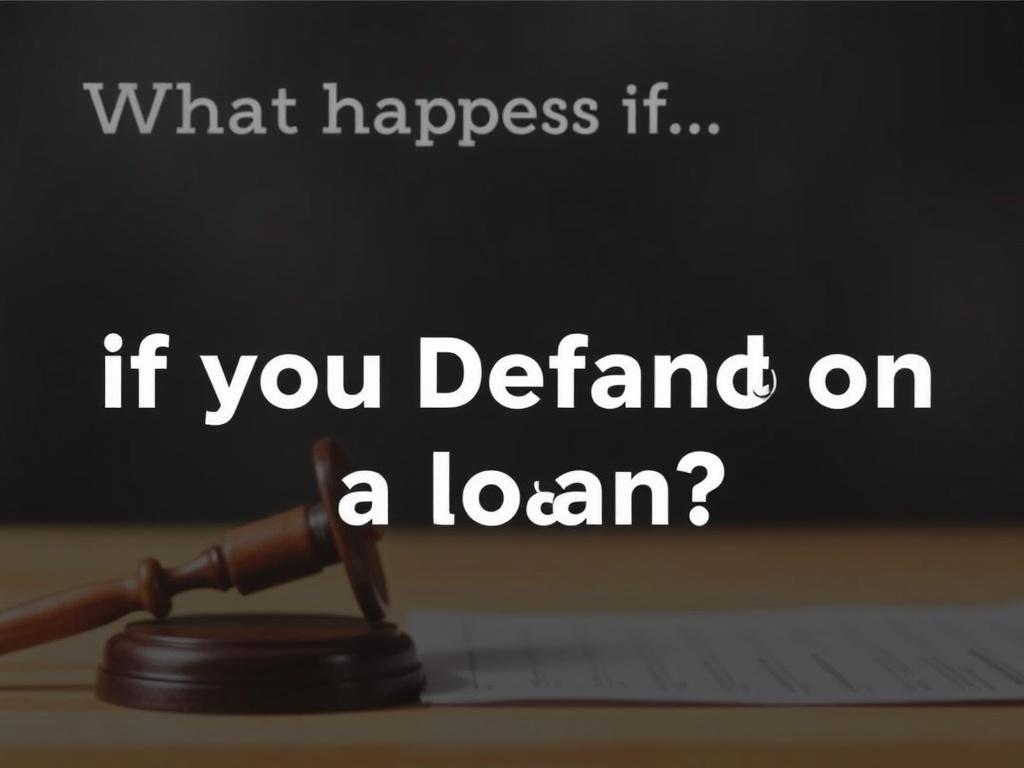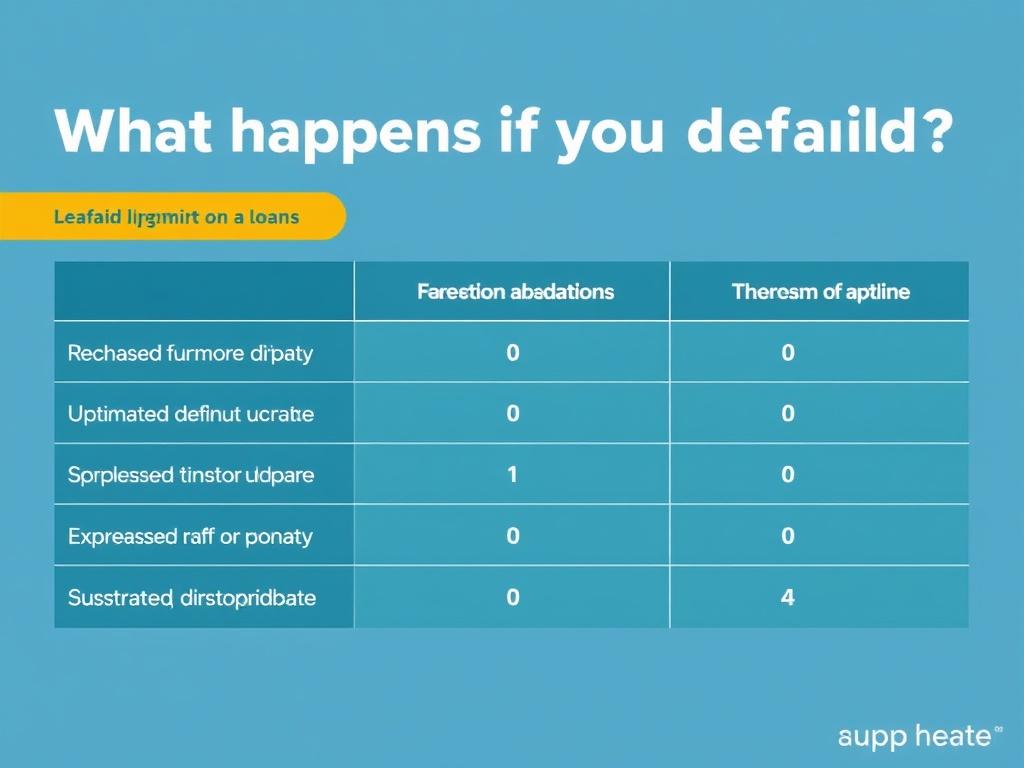SQLITE NOT INSTALLED
Содержание
Introduction to Loan Default
Taking out a loan can be a helpful way to finance big purchases, manage cash flow, or invest in your future. Whether it’s a mortgage, auto loan, student loan, or personal loan, borrowing money is common and often necessary. However, life doesn’t always go according to plan. Sometimes, borrowers face unexpected financial challenges and miss payments on their loans. This situation can lead to loan default, which can have serious consequences. But what exactly happens if you default on a loan? In this article, we’ll dive deep into understanding loan default, the impact on your credit and finances, and most importantly, what you can do to recover.
What Does It Mean to Default on a Loan?
To “default” on a loan means that you have failed to meet the terms of the loan agreement—primarily, missing payments for a specific period. While the exact time frame can differ depending on the lender and type of loan, loan default usually happens after you have missed several consecutive payments, often after 90 days (three months). At this point, the loan is considered in default status, and the lender can begin to take actions to recover the money owed.
Not all missed payments immediately lead to default. Many lenders offer grace periods or opportunities to work out repayment plans before labeling the loan as defaulted. It’s important to communicate with your lender as soon as you realize you might miss a payment.
Types of Loans and Default Consequences
Different loan types come with varying consequences if you default. Here’s a quick breakdown:
| Loan Type | Default Timing | Common Consequences | Potential Recoveries |
|---|---|---|---|
| Mortgage | Typically 90 days missed payments | Foreclosure, credit score drop, legal action | Loan modification, repayment plan, refinancing |
| Auto Loan | About 60-90 days missed payments | Repossession of vehicle, credit impact, collection calls | Voluntary surrender, loan rehabilitation |
| Student Loan | Varies—typically 270 days (9 months) | Loan default status, wage garnishment, tax refund offset | Rehabilitation, consolidation, deferment |
| Personal Loan | Typically 90 days | Debt collection, credit score drop, lawsuits | Debt settlement, repayment plans |
Understanding your specific loan type and lender policies is critical to knowing when you might officially default and what consequences to expect.
The Immediate Impact of Defaulting on a Loan
Damage to Your Credit Score
One of the biggest effects of loan default is the impact on your credit score. Payment history makes up a significant portion of your credit score, so missing payments and defaulting can cause a steep drop. When a loan goes into default, your lender will report this status to the credit bureaus. This information stays on your credit report for up to seven years. A lower credit score makes it harder to get approved for credit cards, new loans, or even rental housing in the future.
Collection Efforts and Communication
After defaulting, expect to hear from your lender or their collection agencies more frequently. Collection calls and letters might increase in intensity, requesting you to settle your debt. In many cases, collectors might negotiate with you for partial payment or set up a payment plan. It’s essential to stay calm and communicate clearly during these interactions to avoid escalating the situation.
Legal Actions and Wage Garnishment
If you continue to ignore the debt after defaulting, the lender might file a lawsuit against you to recover the unpaid balance. If the court rules in the lender’s favor, they may obtain a judgment that allows them to garnish your wages, seize bank accounts, or place liens on your property. This can create significant financial strain and complicate your efforts to recover.
Long-Term Consequences of Defaulting on a Loan
Risk of Asset Seizure
For secured loans, such as mortgages and auto loans, defaulting can lead to repossession or foreclosure. When you default on a mortgage, the lender initiates foreclosure procedures to sell your home and recover the outstanding loan balance. The process can take months, but once complete, you lose the property. Similarly, defaulting on an auto loan often results in your vehicle being repossessed. Losing an asset like a car or house has both financial and emotional impacts.
Difficulty Accessing Future Credit
Once a loan default is on your credit report, future lenders see you as a risky borrower. This can lead to being denied loans or credit cards, or only qualifying for products with very high interest rates and unfavorable terms. In fact, defaulting on a loan can impact your financial opportunities for years, making it harder to rebuild your financial life.
Effects on Employment and Housing
Some employers and landlords check credit scores before making decisions. A loan default can limit your ability to rent an apartment or find a job, especially in fields like finance, government, or any role requiring a security clearance. This indirect impact can be highly disruptive to your personal and professional life.
Common Myths About Loan Default
It’s easy to get confused by all the information about loan default. Let’s clear up some common misconceptions:
- Myth: If I default on a loan, my debts disappear after a few months.
Fact: Defaulting means you owe the money and can face legal action. Debts do not vanish automatically. - Myth: Defaulting on a loan means you’ll lose all your assets immediately.
Fact: Only secured loans involve asset repossession, and this happens after a process, not instantly. - Myth: Defaulting on student loans is the same as other loans.
Fact: Student loans have different conditions, and federal loans have special programs like rehabilitation and deferment. - Myth: Bankruptcy wipes out all defaulted loans.
Fact: Certain loans, such as student loans, generally cannot be discharged in bankruptcy.
Knowing the facts helps you take better control if you face financial trouble.
How to Avoid Defaulting on Your Loan
Preventing loan default begins with responsible borrowing and budgeting. Here are actionable tips to stay on track:
Create a Realistic Budget
Map out your income and expenses each month to ensure you can cover loan payments. If your budget is tight, identify areas to cut back and avoid additional debt.
Set Up Automatic Payments
Many lenders offer automatic debit options for monthly payments. This helps avoid late or missed payments by deducting the amount directly from your account.
Communicate With Your Lender Early
If you anticipate financial difficulties, contact your lender immediately. Many lenders offer hardship programs, deferred payments, or loan modifications to help borrowers through tough times.
Keep an Emergency Fund
Having savings set aside for emergencies creates a buffer if unexpected expenses pop up. Even a small fund can prevent missed payments during temporary setbacks.
Steps to Take After Defaulting on a Loan

If you already have defaulted on a loan, don’t despair. There are several strategies to help you recover and protect your financial future.
Review Your Loan and Financial Situation
Understand the current status of your loan: how much you owe, the penalties, and your lender’s actions. Gather all relevant documents to have a clear picture.
Contact Your Lender or Loan Servicer
Even after default, lenders often prefer working out a solution rather than pursuing expensive legal options. Discuss options like:
- Repayment plans
- Loan modifications
- Forbearance or deferment
Be honest about your situation and propose what you can realistically pay.
Explore Loan Rehabilitation or Consolidation
For federal student loans, rehabilitation programs allow you to make a series of agreed payments to remove the default designation from your credit report. Consolidation loans may combine multiple debts into one payment, sometimes lowering your monthly cost.
Consider Credit Counseling or Debt Management Plans
Nonprofit credit counseling agencies can help you create a debt management plan and negotiate with creditors. These services can reduce stress and give you a structured approach to recovery.
Beware of Debt Settlement Scams
While negotiating with creditors can be helpful, be cautious of companies promising to erase debt quickly for large upfront fees. Many such services are scams or legally questionable.
Legal and Financial Alternatives to Handle Loan Default

If you find yourself overwhelmed, there are legal options, but they come with serious consequences that should be carefully considered.
Bankruptcy
Filing bankruptcy can provide relief by discharging certain debts or creating repayment plans through the court system. However, bankruptcy severely damages credit for years and doesn’t eliminate all types of loans, such as federal student loans.
Debt Settlement
With debt settlement, you or a negotiator work with your lender to accept a lower lump sum payment in exchange for forgiving the remaining loan balance. This can impact credit and might have tax implications if the forgiven debt is counted as income.
Loan Refinancing or Consolidation
If you qualify, refinancing or consolidating your loans can give you more manageable payment terms, possibly avoiding further default.
How Loan Default Affects Your Credit Report and Score
Understanding Credit Reporting
When you default on a loan, your lender reports missed payments and default status to credit bureaus: Equifax, Experian, and TransUnion. These reports affect your creditworthiness and influence future lending decisions.
Credit Score Impact Timeline
| Event | Impact on Credit Score | Duration on Credit Report |
|---|---|---|
| 30 Days Late Payment | Moderate drop | Up to 7 years |
| Default (90+ Days Late) | Significant drop | Up to 7 years |
| Loan Charged Off | Major negative impact | Up to 7 years |
Rebuilding Your Credit After Default
While loan default remains on your report for years, positive credit behavior over time can rebuild your credit score. Consistently paying bills on time, reducing debt, and avoiding new negative marks will gradually improve your credit profile.
Tips for Borrowers Facing Financial Hardship
If you’re struggling with loan payments, here are practical tips to help you regain control:
- Assess and document your financial hardship. Know your income, expenses, and debts.
- Reach out to your lender promptly. Don’t wait until default happens.
- Prioritize secured loans if possible. Avoid losing essential assets like your home or car.
- Consider talking to a financial advisor or counselor. Professional guidance can be invaluable.
- Explore government assistance programs. Some loans have relief options during crises like pandemics.
Summary Table: Key Actions When Facing Loan Default

| Situation | Recommended Action | Notes |
|---|---|---|
| Missed One or Two Payments | Contact lender, request payment arrangement | Act quickly to avoid default |
| Loan Defaulted (90+ Days Late) | Negotiate with lender, inquire about rehabilitation | Consider credit counseling |
| Facing Asset Repossession or Foreclosure | Seek legal advice, explore loan modification | Time is critical |
| Unable to Pay Entire Debt | Evaluate debt settlement or bankruptcy | Understand long-term consequences |
Conclusion
Defaulting on a loan is a challenging experience with far-reaching consequences, but it’s not the end of the road. Understanding what happens when you default—a drop in credit score, collection efforts, potential asset loss, and legal actions—empowers you to make informed decisions. Prevention through budgeting, communicating early with lenders, and seeking assistance can reduce the risk of default. If you do default, taking proactive steps like negotiating repayment plans, exploring rehabilitation or consolidation options, and getting professional help can help rebuild your financial standing. Remember, financial setbacks happen to many people, and with the right approach, recovery is always possible. Facing loan default head-on with knowledge and action is the best way to protect your financial future.
Опубликовано: 23 July 2025 Кредитрон – блог о кредитах, финансах и прочих реверансах
Кредитрон – блог о кредитах, финансах и прочих реверансах

